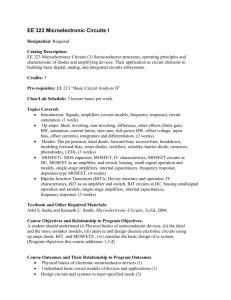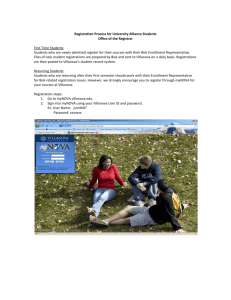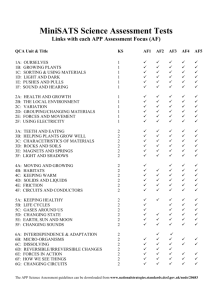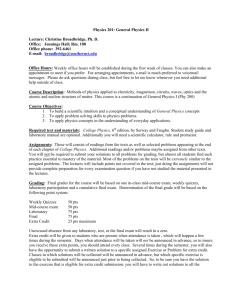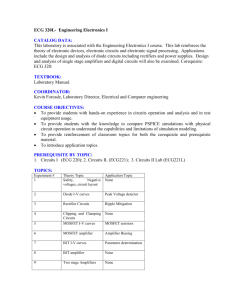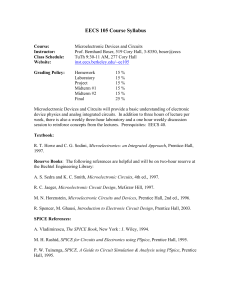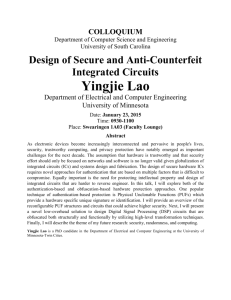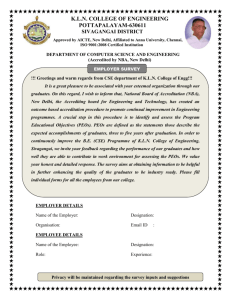Course Information Handout
advertisement
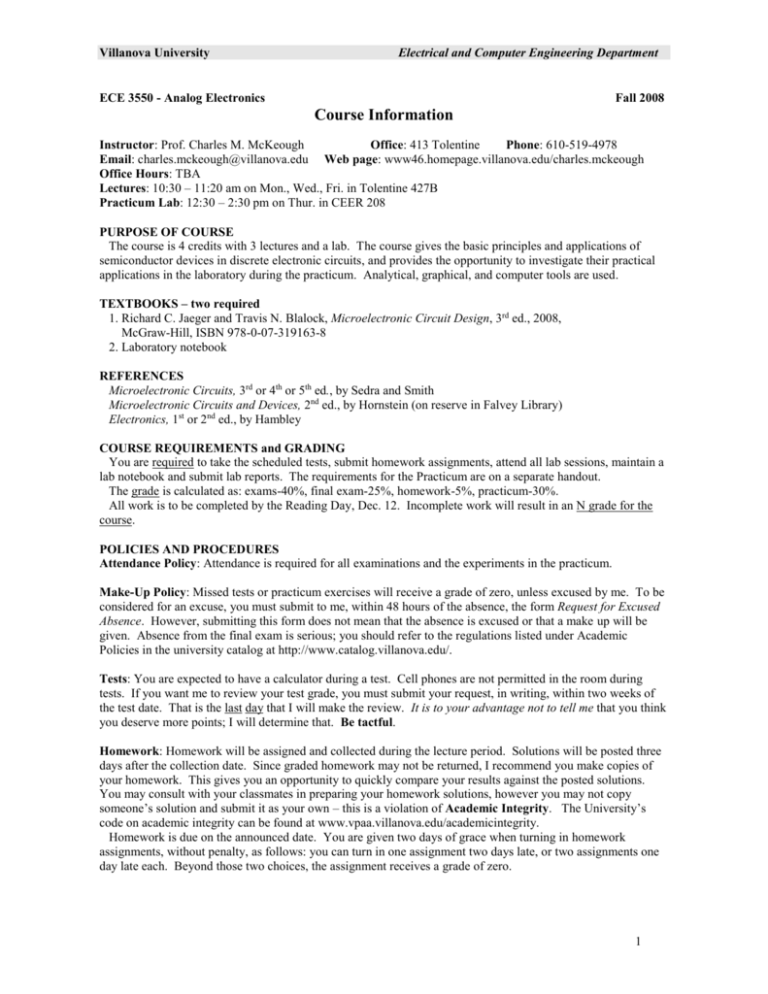
Villanova University Electrical and Computer Engineering Department ECE 3550 - Analog Electronics Fall 2008 Course Information Instructor: Prof. Charles M. McKeough Office: 413 Tolentine Phone: 610-519-4978 Email: charles.mckeough@villanova.edu Web page: www46.homepage.villanova.edu/charles.mckeough Office Hours: TBA Lectures: 10:30 – 11:20 am on Mon., Wed., Fri. in Tolentine 427B Practicum Lab: 12:30 – 2:30 pm on Thur. in CEER 208 PURPOSE OF COURSE The course is 4 credits with 3 lectures and a lab. The course gives the basic principles and applications of semiconductor devices in discrete electronic circuits, and provides the opportunity to investigate their practical applications in the laboratory during the practicum. Analytical, graphical, and computer tools are used. TEXTBOOKS – two required 1. Richard C. Jaeger and Travis N. Blalock, Microelectronic Circuit Design, 3rd ed., 2008, McGraw-Hill, ISBN 978-0-07-319163-8 2. Laboratory notebook REFERENCES Microelectronic Circuits, 3rd or 4th or 5th ed., by Sedra and Smith Microelectronic Circuits and Devices, 2nd ed., by Hornstein (on reserve in Falvey Library) Electronics, 1st or 2nd ed., by Hambley COURSE REQUIREMENTS and GRADING You are required to take the scheduled tests, submit homework assignments, attend all lab sessions, maintain a lab notebook and submit lab reports. The requirements for the Practicum are on a separate handout. The grade is calculated as: exams-40%, final exam-25%, homework-5%, practicum-30%. All work is to be completed by the Reading Day, Dec. 12. Incomplete work will result in an N grade for the course. POLICIES AND PROCEDURES Attendance Policy: Attendance is required for all examinations and the experiments in the practicum. Make-Up Policy: Missed tests or practicum exercises will receive a grade of zero, unless excused by me. To be considered for an excuse, you must submit to me, within 48 hours of the absence, the form Request for Excused Absence. However, submitting this form does not mean that the absence is excused or that a make up will be given. Absence from the final exam is serious; you should refer to the regulations listed under Academic Policies in the university catalog at http://www.catalog.villanova.edu/. Tests: You are expected to have a calculator during a test. Cell phones are not permitted in the room during tests. If you want me to review your test grade, you must submit your request, in writing, within two weeks of the test date. That is the last day that I will make the review. It is to your advantage not to tell me that you think you deserve more points; I will determine that. Be tactful. Homework: Homework will be assigned and collected during the lecture period. Solutions will be posted three days after the collection date. Since graded homework may not be returned, I recommend you make copies of your homework. This gives you an opportunity to quickly compare your results against the posted solutions. You may consult with your classmates in preparing your homework solutions, however you may not copy someone’s solution and submit it as your own – this is a violation of Academic Integrity. The University’s code on academic integrity can be found at www.vpaa.villanova.edu/academicintegrity. Homework is due on the announced date. You are given two days of grace when turning in homework assignments, without penalty, as follows: you can turn in one assignment two days late, or two assignments one day late each. Beyond those two choices, the assignment receives a grade of zero. 1 TOPICS (tentative) ▪ Single time constant circuits: time and frequency domain ▪ Diodes: characteristics, analysis methods, models ▪ Diode applications: rectifier circuits, limiters, clampers, zeners, regulators ▪ Physics of the semiconductor diode ▪ Amplifiers: models, frequency response ▪ Op amp: models, circuit applications ▪ Physics of MOSFETs ▪ MOSFET circuits at dc, MOSFET as an amplifier ▪ Physics of BJTs ▪ Analysis of BJT circuits at dc analysis; biasing, ▪ Small signal models of the BJT and MOSFET ▪ Common emitter and common source amplifiers: gain, input and output impedance ▪ Common collector and common drain amplifiers: gain, input and output impedance ADDITIONAL INFORMATION ▪ Last day for an authorized withdrawal (WX) is November 12 (Wed.). ▪ Semester recess starts October 13 (Mon.) and classes resume October 20 (Mon.). ▪ Thanksgiving recess starts after the last class on November 25 (Tues.) and classes resume December 1 (Mon.). ▪ December 11 (Thu.) is the final day of class. ▪ December 12 (Fri.) is the Reading Day. 2 ECE 3550 - Analog Electronics ECE DEPT. PROGRAM EDUCATIONAL OBJECTIVES AND PROGRAM OUTCOMES The following information is dated January 7, 2004. Program Educational Objectives (PEO’s) The educational objectives (PEO’s) of the Villanova University Computer Engineering and Electrical Engineering programs are to develop graduates who: PEO 1) Use their knowledge, analytical, and design skills to generate solutions to practical real world problems. PEO 2) Communicate and work effectively with others in different roles and positions. PEO 3) Continue to develop their professional knowledge and skills throughout their career. PEO 4) Have successful careers, and practice their chosen discipline with professionalism, care, and integrity. Program Outcomes (PO’s) Computer Engineering and Electrical Engineering program graduates have: (a) an ability to apply knowledge of mathematics, science, and engineering. (b) an ability to design and conduct experiments, as well as to analyze and interpret data. (c) an ability to design a system, component, or process to meet desired needs. (d) an ability to function on multi-disciplinary teams. (e) an ability to identify, formulate, and solve engineering problems. (f) an understanding of professional and ethical responsibility. (g) an ability to communicate effectively. (h) the broad education necessary to understand the impact of engineering solutions in a global and societal context. (i) a recognition of the need for, and an ability to engage in life-long learning. (j) a knowledge of contemporary issues. (k) an ability to use the techniques, skills, and modern engineering tools necessary for engineering practice. (l) an ability to apply advanced mathematical and statistical principles to complex engineering problems. (m) an understanding of the values of the Christian humanistic tradition. 3
